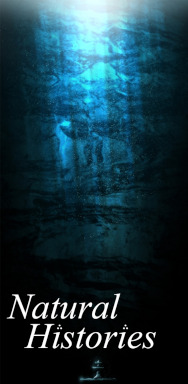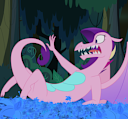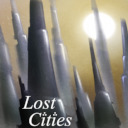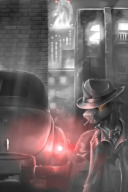
The Fountain
In the heart of Equestria there is a haunted forest, and in it an enchanted glade.
The advancing trees have yet to claim this space, though every year they grow bolder. Saplings pry loose the cobblestones that winter has weakened with ice, and the questing roots of the great oaks push up the soil, wrapping the last broken pieces of this once great city in their jealous grasp. Soon only the cracked and dead fountain in the center of the clearing will remain, its basin filled with stagnant rainwater and a green skim of algae, reminding the animals and no one else that once this was the capital of an empire.
The fountain does not concern us. The age of ponies, in this part of the world at least, in this wild, haunted forest, has passed. The land has new masters.
It is a spring day when a salamander finds the glade. The trees are still bare, but beneath them the dense undergrowth has already begun to bloom with an explosion of new leaves. A parliament of swamp roses holds session over the old western path, where the sinking cobblestones create a shallow depression for the melting snow. The roses love the damp soil; from a single seed, dropped by some bird or insect years past, they have infested half the glade, turning it into a carpet of twisting stems. A riot of coral-pink blossoms covers the vines and hides their sharp thorns.
The salamander does not care for the flowers. Or the thorns, for that matter. Her thick scales, as hard as glass and scorched black around their saw-toothed edges, brush aside the roses like they are nothing. She tears her way through the thicket, cauterizing a path that smaller game animals will use for years. The ground smokes where her claws touch.
She is not a smart creature. Mature female salamanders do not have to be. They have no natural predators. They eat almost anything – rotting leaves, carrion, tender shoots, eggs, even animals that are too sick, wounded or stupid to move out of their path. It is all the same to them. All fuel.
Some ancient instinct measures the glade and finds it agreeable. She approaches the fountain in the center, with its stones warmed by sunlight shining through the broken canopy, and crawls up into the basin. The water inside breaks into a feverish boil, filling the glade with steam.
Up each layer of the fountain she climbs. The stone resists her heat, but the little vines sprouting from the cracks shrivel and blacken. They fall away, leaving slender smears of ash like shadows.
The highest level of the fountain is a large marble bowl that once flowed with water. A few leaves and twigs resting there vanish into cinders. The salamander curls her body in the hollow, letting it grow warm, until the stone glows a dim, angry red. It pops like pond ice, and new cracks appear; marble was never meant for such heat. It begins to burn.
That is hot enough, instinct says. She lays her egg in the bowl. And then, all her maternal instincts exhausted, she climbs down from the fountain and tears her way back into the forest again. She has already forgotten why the glade mattered to her at all.
Slowly, the fountain cools. The marble is black now, riven with chips and branching fractures. The egg inside, a charcoal diamond about the size of a pony’s hoof, rests patiently. The tiny life stirring within, more fatty liquids than meat at this point, does not understand time any more than its mother does.
It will wait, unchanging, for years. Around it, around the fountain, the seasons resume their endless turn.
* * *
It is winter when the cockatrices arrive.
Cockatrices are not social monsters, as a rule, but in the colder months they sometimes band together like other junglefowl, sharing warmth and protection from predators. For while a hungry manticore might decide to take a chance on a lone cockatrice, even a starving one would think twice before attacking an entire covey of them. The forest is littered with statues of those who tried.
The dominant hen scouts around the clearing, hopping clumsily on the snow, flapping through it as though trying to swim toward the fountain, which radiates an unusual warmth. No snow touches it. The cobblestones around it are dry and bare. The basin’s rim is just a bit too high for her to peer into, but cockatrices have a keen sense of smell, and she detects no animal scents from within, only rotting leaves and fallen bark and an odd, acrid taste she has never encountered before. A mixture of ash and stone that has no precedent in the enchanted forest. She has no experience with lava.
But all seems safe. The myriad stones, in the fountain and the cobbled ground beneath the snow, appeal to her. They sing to something primal in her nature. Cockatrices adore shaped stone, whether they find it or create it themselves.
She calls to her brothers with a rumbling, querulous trill, and they emerge from the bare trees to gather by her side. She hops up onto the rim, poses with her wings outspread to demonstrate that this is her domain, then flops awkwardly into the fountain and pushes the mess of leaves and sticks that have fallen there into a rough pile that will become her nest. The others do the same, and soon the basin echoes with chirps and trills and the dry, papery rush of scales twining like centipedes amidst dead leaves and feathers.
One cock does not join his siblings. He perches on the rim of the basin and hisses at them, at the fountain, at the unnatural warmth that, though it drives away the dreadful winter chill, strikes a chord of fear in his tiny brain. The scent of burned stone alarms him. He flaps and dances, warning the others of the danger they have found.
This defiance angers the hen. She jumps up beside him, fluffs up the rill of feathers around her head, and hisses a challenge. The cock, quite a bit smaller than the hen, refuses to back down, and they engage in a frank exchange of opinions and razor-sharp claws.
That settles the matter. The bleeding male gathers what dignity he can still find and departs the covey, leaving a trail of shed feathers and ruby drops, like little flowers that melt into the snow. He vanishes into the empty forest, and a few minutes later the other cockatrices hear a loud crash, breaking branches, and a bird’s cry that cuts off abruptly. The silence that follows seems to last forever as the forest holds its breath.
In time, the covey resumes its gentle chatter. They have already forgotten their departed brother.
Cockatrices are not social monsters, as a rule.
* * *
The enchanted forest is the site of a battle. It has been raging for centuries and will not be settled for decades more, but already the winners and losers are clear. The age of the beech-maple is coming to an end, replaced by an alliance of oak and ash.
When ponies still trod this land, when it was not a forest but their greatest city, they filled the avenues and gardens with tame trees, harmless as kittens. They admired the ostentatious and unusual – greater silktrees and crimson kings and fragrant dogwoods. But more than any of these they loved maples, which grew slowly and in the autumn months underwent a brilliant metamorphosis, their canopies erupting with brilliant yellows and oranges, reds as dark as blood, and even stranger colors. The sugar maples bedecked themselves in incandescent pink, like a watermelon’s flesh, and for weeks until the first frost the entire city took on the aspect of a dream, a riot of colors like an artist’s palette smeared across the land. Another wonder to remind ponies that they were the chosen of the gods, gifted with beauty, destined to rule the world.
Since the city’s fall and abandonment, the trees have run wild. The more delicate, ornamental breeds died quickly, made hollowed nests by insects or freezing in the new winter chill. But the maples survived, and their allies the beech trees joined them in reclaiming the city, tearing up the streets with their roots and overturning the stubborn walls. It was the work of centuries, of generations, but slowly the forest reclaimed the city, and only recalcitrant holdouts like our fountain survived amidst the verdant ruin.
The maples and beeches thrived in the cool weather that followed the city’s fall. Their strong roots found easy purchase in the poor, rocky soil that defied so many other trees. They built a new empire, wildy beautiful and crawling with life. In other lands, it might have lasted forever. But ponies were a magical species, and their city dripped with enchantments, cantrips, charms and great sorcery. Spells not as weak as their masters; spells that outlasted them, that seeped into the land like acid through skin.
The maples resisted the magic. They had no need for it. The beeches noticed the spells, but they were too few in number to make a difference, in the end.
It was the oaks who felt the magic most keenly. From their isolated, pitiful little groves, the oaks saw the magic, and they drank it into their roots. The loose spells twisted them, bent them, and made them into something new. Something the world had never seen.
In the space of a season, the enchanted oaks exploded from their tiny redoubts. Acorns filled the forest, sprouting with unnatural speed into seedlings that grew like grass. Their leaves rattled and their branches bent in the calm, windless air. The new trees sent down deep roots, questing for the buried remains of the city, and what they found they consumed. All the magic that was hidden in the ruins became theirs, and the wild forest changed. Shadows deepened into pools. Animals dreamed red nightmares and woke as monsters. The heart of nature beat faster and faster, a thing alive with fury and aimless intent, pursuing itself, being pursued, flying, fleeing and everything eating, eating, eating, and over generations of this madness the forest stopped being any forest that ponies would recognize. It became the haunted forest.
A few lone maples remain in the fountain glade. The roses crawl up their trunks, but the trees do not mind. Every year the forest grows warmer, and the oaks and ash thrive. They release more seeds, and more of their saplings survive. Within a generation, only a few maples will remain, locked away in stony grottos or bent beneath the cliffs, huddled refugees of a battle so slow that the stars will change shapes in the night sky before the oaks declare victory.
The cockatrices know none of this. But they relish the acorns that cover the forest floor when autumn comes round again.
* * *
It is summer, and the cockatrices have new neighbors.
A pack of timberwolves is moving in. A towering sycamore that grew on the banks of a nearby stream fell during a storm some weeks past, flattening dozens of lesser trees and laying its massive crown flat upon the earth. Leaves the size of dinner plates are scattered across the forest, and the timberwolves gather them with industry, carrying them to a dense thicket where several fallen trees rest in a jumbled pile, a mess of sticks and splintered branches and thick trunks snapped like bones when the sycamore fell. The timberwolves bring the fallen leaves here and skewer them on the twigs, creating a rough thatched roof for their den.
The timberwolves are wary of the cockatrices. The cockatrices are wary as well. Neither species sees the other as food, and the timberwolf den is far enough from the unnaturally warm fountain that outright conflict can be avoided. But the fountain now sports an addition, a surprised, petrified timberwolf peering into the basin. Its calcium leaves are delicate, and many have already broken, falling as flakes onto the cobblestones. Soon all the stone leaves will fall, as they would from a tree in autumn, and only the timberwolf’s skeleton will remain, locked in stone for all time.
The seasons turn, and when spring arrives a litter of timberwolf cubs joins the Fountain Pack and cries inside the den. Fern and honeysuckle paws scratch blindly at their littermates; their bones are the soft greenwood of briars. The adults pile up thistles and poison ivy around the den.
The manticores that sometime soar overhead are meat eaters, and they do not savor timberwolves. Rather, they hate timberwolves; the mere sight of them drives manticores into a frenzy of claws and fangs and stingers that only ends when one or the other is dead. The hatred is unreasoning and guileless – it drives even young manticores to attack entire packs of timberwolves, with no chance of survival. They seem to delight in the carnage, even as the forest floor grows muddy with their blood. Their poison has no effect on the timberwolves, but with row upon row of shark’s teeth they can shred the delicate wolves down to bare branches, and their claws rip out the delicate vines that are the wolves’ guts.
Twice now manticores have found the Fountain Pack. Their corpses, picked at by scavengers, litter the forest around the den. A single bat wing lies lodged between two branches, tattered and rent and dangling in strips. The timberwolf alpha is ferocious in defense of her den.
But time is not on her side. The carrion attracts scavengers, which every day attract more attention. Above the glade, turkey vultures ride the thermals in wide loops, waiting for their chance to dive down and grab a scrap of flesh. All this commotion calls out to darker appetites within the forest. And one day the trees sway as something rough and huge slouches between them. Beyond the trees, the lush undergrowth blocks sight beyond more than a few feet, but the timberwolves can smell the new arrival. It stinks of rot and bones and the sharp, sour tang of magic, loose and wild and hungry.
The pack assembles at the edge of the glade. Behind them, a few curious cockatrices poke their heads out of the fountain’s basin, and just as quickly retreat. The wolves growl and snarl and puff themselves up, but the ones at the back begin to edge away. The ground trembles beneath their dandelion paws as the intruder nears.
It stops just out of sight. The bushes rattle and the trees bend, and a huge shadow drinks the light out from the forest. A sickening, cloying scent stuffs their muzzles.
The standoff lasts for only a minute. Too many wolves, or perhaps the unseen beast catches sight of the cockatrices. Or perhaps it simply isn’t hungry. Regardless, the trees sway again as it turns and lumbers away. The air slowly clears of the stench of death.
The Fountain Pack retreats to the den. In a few months, the cubs will be old enough to travel with their parents, and they can find a more hospitable part of the forest.
But then, that is how they came to be here.
* * *
The magic loose in the forest works in great ways, and in small.
Off the path leading to the fountain, in the damp soil where the roses grow, there lies an ancient rowan log, all that remains of a tree that was old when ponies first laid the stones of their city here. The peaty, acidic soil kept it from rotting for an age, but the churn of centuries has eroded the shield of dirt that preserved it so faithfully, and now, exposed to the sun and the wind and the rain and worms and spiders and burrowing centipedes tracing whorls beneath its bark, the log begins to decay.
Rowan has a particular affinity for magic. It is a witch’s wood, beloved of shamans, carved into precious, elegant wands by sorcerers. And, soaking in the magic of the enchanted forest for most of a thousand years, this rowan log has become quite magical indeed.
The insects, in their gnawing, felt the magic’s bite first. The tunneling millipedes died and curled into spiral coils that grew crystal chrysalises, and out from these cocoons emerged shadowy motes, little more than specks of darkness that caught the wind and sailed away into the forest, burning passages through whatever leaves and branches and animals they encountered. A colony of ants sampled the log, withdrew, and retired to a life of peaceful meditation in their nest beneath the earth.
But the greatest transformation came to the most humble of beings. Under the bark, in the wet spaces, grew a particular species of slime mold. In a normal forest it amounted to nothing more than a yellow smear, like the yolk of an egg misplaced and dripping from something dead. But, infused with the magic of the forest, the slime mold changed. It grew stronger. Hardier. More ambitious.
The mold burst out from the log and swallowed the flinders. Within days it swelled from a barely visible speck of a lemon’s rind into a messy, wet mass the size of a blanket. It pulsed with thoughtless hunger, stretching out, extending fibrous tendrils out into the roses. And it found them nutritious.
It is autumn now, in the glade. The slime mold is a cancer. The roses are all gone, and in their place a yellow trellis remains, dripping ichor as bright as the sun. The mold digests the stems and reaches out hair-thin feelers toward its next prey.
It is winter, and the mold is not dead. The fountain’s unnatural warmth keeps it alive even as the rest of the forest sleeps. It crawls up the maples, an inch a day, and decides it likes the height.
It is spring, and the mold has overrun a quarter of the glade. It creeps up on the bare rock around the fountain. The cockatrices stare murder at it, but the slime has no eyes and refuses to turn to stone, despite their best efforts. A vague notion of danger begins to build in the elder hen’s mind, an uneasy hollowness in her gizzard. Soon the decision to abandon the fountain will fall on her wings.
At the height of summer, the slime is triumphant. Half the glade has fallen to it. The trees are yellow spires, dripping with yolk. Several have collapsed already, and others creak ominously in the wind. The mold loves the sound. It loves the promise of broken trees and exposed heartwood, delicious like the marrow of bones. It wonders what the cockatrices will taste like.
But then the spiders arrive. A troop of them, swollen by the same magic as the mold. They are bristly and stout, with powerful legs for climbing and leaping. As big as foxes, they scuttle out of the woods into the glade, find the mold, and give it a taste.
It is, apparently, delicious. The spiders go mad, scooping ichorous yellow lumps into their mouthparts. Their stomachs seem endless. For hours they feed, chasing down every yellow drop they can find. They tear up the logs and scour the trees, their bodies a black, living carpet of twitching legs. A few venture too close to the fountain and stay there forever. When the rest are done, a faint tracery of delicate silk shrouds the glade, veil thin, whispering like fog.
Only a few specks of mold remain. They hide under the rim of the fountain, little yellow beads in dark cracks, and conclude that the old ways were better.
* * *
It is winter again, the season when manticores die.
Manticores must eat meat to survive, but in winter all their prey sleeps in dens burrowed into the snow, or flies south, or swims beneath the ice-crusted lakes. They catch a few deer here and there, but they grow weak with hunger. By the time spring returns to melt the snow and spread her green mantle over the trees, the manticores are only half in number. The ones who still live are starving.
They leap from the trees into the fountain. Surprise is the only way to attack cockatrices, and they would not dare to ambush the entire covey had hunger not hollowed them out, left them desperate, willing to take foolish risks for a little meat.
They are lucky. Only one cockatrice sees them coming, and only one manticore lands like a meteor, shattering into countless pieces in a deafening crash that startles birds into flight for miles around. His brothers reach the fountain a moment later, and the bloodbath begins. At this range, the cockatrice’s magic gaze is useless – they need to fix their target, impossible to do in the scrum of claws and scorpion tails and shark’s teeth. The dominant hen realizes the nest is lost and sounds a warbling retreat. They abandon the fountain, dodging around statues of timberwolves and spiders and into the trees. The undergrowth swallows them after only a few paces.
The manticores let the survivors go. They have what they want. Three twitching bodies stain the fountain, filling it with a puddle of their blood. The manticores scream in delight and begin to feed on the fallen cockatrices. They lather themselves in gore. Feathers, flesh, beaks and bones all vanish into their gullets. It is the closest feeling to joy that monsters can know.
They are still euphoric when one of them, a scrawny male who barely survived the winter, spots the timberwolf cub at the glade’s edge.
It should not have strayed from its den. But timberwolf cubs are like foals in many ways – playful, careless and curious. The pack does not realize this one is missing until they hear the manticores howl again, followed by the cub’s brief cry.
When the timberwolf alpha arrives, the cub is gone. Only a scattering of fern and honeysuckle leaves remains. Leaves, and the manticores, who turn to face their new enemy.
In the battle that follows there is too much death. Or, from another perspective, just enough. So much blood is spilled from the cockatrices and the manticores and the timberwolves that it paints the glade red. The scent of it clogs the air. And above them all, forgotten, overlooked, a tiny bit of monstrous magic that has waited for decades drinks in all the bloodshed and begins to wake.
During the battle, the fountain grows hot. In the marble cup at its zenith, the salamander’s egg begins to tremble. Cracks appear in the black carbon shell, and out from them spills an evil red light. The stone begins to smoke. The survivors of the battle – still locked together, teeth in flesh and claws digging through guts that are vines – have just enough time to smell an acrid odor, stronger even than the scent of all the blood, and wonder at the sudden heat. It is pleasant, like a revelation of sunshine on a cloudy day.
The egg splits fully open, and the salamander is born. A wave of fire erupts from the shell, consuming the fountain and the stones and the trees and the manticores and the timberwolves and the statues and everything else in the glade. The blood in the basin flashes into pink steam before the flames obliterate even that. A thunderous blast digs a crater several feet into the earth.
Where the fountain stood, a holocaust rages. Before it burns out a tower of smoke will rise for miles into the still air, covering half the haunted forest with an ashen pall. And out from the flames crawls a tiny, lizard-like creature, no larger than a pinecone, glowing like a star and oblivious to all the stories that ended with its birth.

























OK, Everfree is truly a murder forest. Now I kinda understand why Zecora would be seen as strange for living there. I can also see why no pony has tried to reclaim the place. I kinda wonder what came to the edge of the glade, and I kinda don't want to know.
10207922
If it was a big Ursa Major that absent-mindedly trod on the salamander egg and squished it, we could have made a joke about Smokey the Bear preventing forest fires.
You know, when you talk of plants with thoughts and agency -- of roses holding parliament, and trees seeking or disdaining magic -- I'm frankly unsure where the metaphor ends and frank description begins.
I also wonder at how leafy these timberwolves seem to be. What of the ones seen in the show, without any leafy skin of their own? A different breed, or simply sickly? Perhaps that was what drove them to seek ponies as prey.
Feh, you think the Everfree is hardcore?
You ain't never walked through the Jersey Pine Barrens!
I mean, you're still here, so CLEARLY you haven't walked through them!
Salamanders always annoy me in this sort of setting, because I can never tell initially whether or not the author is talking about the mythical fire lizard or the tiny, cute amphibian.
10208101
derpicdn.net/img/view/2015/5/5/889393.jpg
An amazing glimpse at the magical ecosystem of Equestrian wilderness!
And an important reminder that there are very good reasons why ponies are so intent on stamping out wild nature and directing things themselves.
I wonder why the manticores didn't attack so in previous years? Perhaps they just weren't as successful.
Oh, and apparently the timberwolves hadn't moved on yet after all.
Oh, was it the salamander egg that waited for decades? Interesting; even in this, then, it looks like there was much passing unseen.
But, of course there was, for that is the way of things. :)
(I do like this concept, by the way; I myself have before wondered about the little stories like this, and reflected on them.)
10208565
Like us. Romantics and neo-primitivists love to talk about the evils of civilization and how humans should go back to mommy Nature, but rarely discuss how damn scary and merciless the natural world is.
These are so satisfying to read. Relaxing and dense, I feel like I've eaten a wonderful meal.
10208717 They forget that Mother Nature is a psychotic bitch that routinely tries to stamp out all the life on the planet, sometimes with help from cosmic interlopers intent in intimately fornicating with her surface.
Tiny bodies, seeking the warmth of a larger partner as they float in the lonely frigid seas of space, fall under her gravitational pheromones and are drawn irresistibly toward her bloated fertile sphere. Oh how swiftly they plow into her! Ramming deep into her crust and spraying forth copious molten curtains resulting from their eternal copulation! For, as with the minuscule males of anglerfish, the Mother Earth's tiny lovers fuse with her forever.
(Insanity is a lovely thing...)
I'm wondering if we're going to see a chapter dedicated to Canterlot.
Goodness, I love me some mystic and feral Everfree Forest badassery. I can't help but wonder if you took inspiration from this piece, judging by the chapter title. I really hope you deliver more when you can. Lost Cities is one of my favorite stories of yours.
I love how alien and dark the Everfree comes across here -- like something far more alien than just a wilderness, something that was soaked through with magic until it became something far darker and more terrible than any simple wild place.
That's amazing